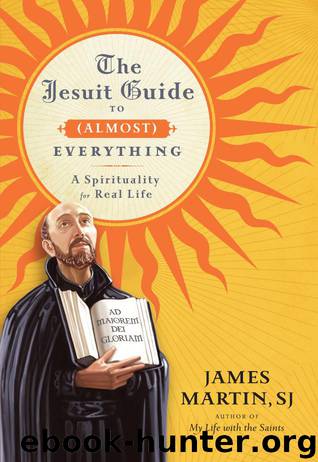The Jesuit Guide to (Almost) Everything by James Martin

Author:James Martin
Language: eng
Format: mobi, epub
ISBN: 9780061981401
Publisher: HarperCollins
Published: 2011-07-12T06:57:34+00:00
Chapter Ten
More by Deeds Than by Words
Friendship and Love
SOME PEOPLE CLING TO the idea that being a member of a religious order means you don’t have to care about real-life human relationships. The thinking goes like this: since we spend all of our time in prayer, we never have to relate to any actual human beings and never have to deal with any interpersonal problems. And we’re thought to be solitary types unconcerned with something as commonplace as friends.
But overall, Jesuits have a lot of experience developing friendships. First, as chaste men, we cannot enjoy the intimate sexual relationships that married men and women can. So besides relying on our friendship with God, our families, and our communities, we count on the love of close friends, both men and women.
Second, Jesuits move around frequently, sent from job to job, and place to place. Over the course of the past twenty years as a Jesuit, I’ve lived in Boston, Jamaica, New York, Boston again, Chicago, Nairobi, New York again, Boston again, and New York again. Each move meant discovering and rediscovering friends. Despite stereotypes people have about celibacy, Jesuits have to grow in the ability to make and keep close friendships. And we value them greatly.
Single, divorced, and widowed people know about this. A single friend of mine was once asked by her company to move far away. Her manager said, “You’re single. You don’t have any kids. Moving will be easy for you.” But precisely since she didn’t have a husband or children as a built-in and portable support system, she didn’t want to leave, because she would be leaving her only supports behind—her friends. They were her primary source of love and affection.
Another stereotype is that we Jesuits don’t know much about human relationships since we’re so “Christian.” My brother-in-law once said, “It must be nice to live in a place where no one argues.”
“What do you mean?” I asked.
“Well,” he said, “isn’t it sort of illegal for Jesuits not to be nice to one another?”
That sums up the common thinking about religious communities: they’re full of holy people who always get along. To that I say, “Ha!”
So the third reason we have become proficient in friendship is that living in a religious order means living with actual human beings who have competing interests and strong opinions. Over time you become adept at dealing with various kinds of personalities. Until my brother-in-law got to know some real-life Jesuits, he remained convinced of our superhuman goodness.
SUNTNE ANGELI?
It reminded me of a story, perhaps apocryphal, about the American Jesuits in the 1860s who were planning a new theology school for young Jesuits in rural Maryland, in a town called Woodstock. Huge numbers of men were then entering seminaries and religious orders, so the building would have to be vast.
The Jesuit provincial worked diligently with architects to draw up plans for the complex, with hundreds of rooms for the Jesuit priests, brothers, and scholastics (those in training); classrooms; an immense dining room; and an ornate chapel.
Download
The Jesuit Guide to (Almost) Everything by James Martin.epub
This site does not store any files on its server. We only index and link to content provided by other sites. Please contact the content providers to delete copyright contents if any and email us, we'll remove relevant links or contents immediately.
The 5 Love Languages: The Secret to Love That Lasts by Gary Chapman(9815)
The Space Between by Michelle L. Teichman(6939)
Assassin’s Fate by Robin Hobb(6216)
Wiseguy by Nicholas Pileggi(5784)
Everything Happens for a Reason by Kate Bowler(4743)
Gerald's Game by Stephen King(4654)
Pillow Thoughts by Courtney Peppernell(4283)
A Simplified Life by Emily Ley(4161)
The Power of Positive Thinking by Norman Vincent Peale(4064)
Harry Potter and the Prisoner of Azkaban (Book 3) by J. K. Rowling(3359)
Resisting Happiness by Matthew Kelly(3341)
Girl, Wash Your Face by Rachel Hollis(3282)
Being Aware of Being Aware by Rupert Spira(3276)
The Secret Power of Speaking God's Word by Joyce Meyer(3218)
The Code Book by Simon Singh(3189)
More Language of Letting Go: 366 New Daily Meditations by Melody Beattie(3029)
Real Sex by Lauren F. Winner(3022)
Name Book, The: Over 10,000 Names--Their Meanings, Origins, and Spiritual Significance by Astoria Dorothy(2987)
The Holy Spirit by Billy Graham(2952)
